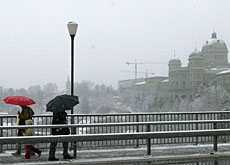Government facing financial challenge

The Swiss government has warned that its policies over the next four years will be dominated by reining in public spending and attempting to spur economic growth.
The president, Joseph Deiss, said it was important to find new ways of reducing expenditure by about SFr2.5 billion ($2 billion) and balancing the budget.
Despite cuts of SFr3.5 billion already voted by parliament, the authorities say they have no choice but to implement another cost-cutting programme.
The federal budget is expected to be SFr2.9 billion in the red in 2005 and SFr1.8 billion two years later.
Deiss explained that the government faced an uphill task, given the financial straightjacket and fierce divisions between Left and Right in parliament.
“We are also living in a more competitive world,” he added.
The president warned that the authorities would have to implement tough financial policies and would only consider fresh spending if it did not mean cuts elsewhere.
New projects scrapped
The tighter spending regime means a number of projects will have to be scrapped or put on hold.
The government announced on Wednesday that it was abandoning plans to create new national parks and that it was delaying plans to connect to the European high-speed rail network.
The other priority for Deiss, who is also the economics minister, is to get the Swiss economy moving. The ministry is forecasting only 1.8 per cent growth in 2004.
The government also wants to increase spending on education and research. The president called for further competition in the domestic market and said highly skilled foreign labour was needed to spur growth.
Deiss added that Switzerland would have to remain attractive to investors by ensuring favourable economic conditions, such as a well-qualified workforce, a flexible labour market and attractive taxation.
Other plans include reform of the welfare system.
The government said any reforms would be gradual, so as to not threaten the country’s political and social stability. Deiss said change could only take place alongside economic growth.
EU relations
The government also wants to boost Switzerland’s role on the international stage. Peace promotion, reducing poverty, improved human rights and protecting the environment will remain key elements of Swiss foreign policy.
However, long-term plans to join the European Union remain on hold for the time being, with the government focusing on a series of bilateral accords.
Deiss said that three conditions were required before EU membership could be considered: an evaluation of the bilateral accords; political support from within Switzerland; and a detailed analysis of the consequences of joining.
The government is expected to issue a report on Swiss relations with the EU by 2007.
swissinfo with agencies
Last December, Parliament adopted the biggest spending cuts programme in Swiss history, trimming SFr6 billion from the federal budget in the years to come.
Despite this, the government’s financial plan for 2005 to 2007 expects deficits that could reach as much as SFr2.9 billion.
These figures do not take into account extra costs or a bigger than planned drop in tax income during that period.
Tax income is already expected to drop by SFr2 billion by 2007.

In compliance with the JTI standards
More: SWI swissinfo.ch certified by the Journalism Trust Initiative










You can find an overview of ongoing debates with our journalists here . Please join us!
If you want to start a conversation about a topic raised in this article or want to report factual errors, email us at english@swissinfo.ch.